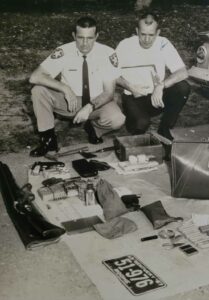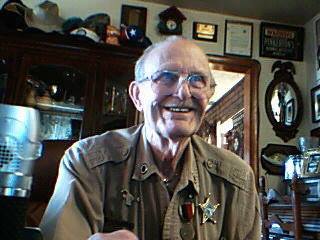People saw my dad as somewhat arrogant and even abrasive at times, but many saw his caring and generous nature as well. He was a hard worker and a good provider for our family.
There are some things I’ve recently discovered about him, however, that have made me love and appreciate him all the more. After reading and studying about the Civil Rights Movement, I’ve come to the conclusion that my father also deserves praise for the bold things he did to help shape my future world in a significant way.
I grew up in the Jim Crow South in St. Augustine, Florida. Although its population was 25% black, I saw hardly anyone of color during my childhood, until a handful of black students began to integrate my high school as late as 1965, when I was a very quiet, shy freshman there.
All the white businesses in St. Augustine had an unfair “no blacks” policy, so we never saw people of color around town. Somehow, our family’s gas station at Crescent Beach, located south of St. Augustine, was able to ignore the town’s requirement and serve anyone we chose.
My parents, transplants from the Midwest, never saw skin color as a problem, so they didn’t feel there was a need to post “Whites Only” signs at our gas station. In reality, blacks didn’t typically show up at our “Whites Only” beach anyway. There was only one small stretch of beach area, known as Butler Beach, where black citizens could safely swim and cool off in the surf. No signs were needed at Crescent Beach. You just understood where you were welcome and where you were not.
In 1963, the black community, living in a totally separate part of town called Lincolnville, understandably felt left out when they weren’t invited to participate in the planning committee that was organized to celebrate St. Augustine’s quadricentennial anniversary in 1965. After all, blacks had played a large part in St. Augustine’s 400-year-long history. It was only right that they be included in the plans.
Several of those living in Lincolnville took a bold stand, and decided it was time to do something to force their inclusion in the upcoming, profitable festivities, and to end the decades-long inequities that had kept them separate from their white neighbors for so many years.
After several unsuccessful protest marches and demonstrations in the summer of 1963, with escalating violence becoming the norm, the citizens in Lincolnville decided the following year to invite Dr. Martin Luther King, Jr. to come help them organize, with the hope that his non-violent methods and charismatic personality would achieve better results and integrate the communities, as several other cities in Florida and the South had been able to do.
Unfortunately, with that new dynamic, the Ku Klux Klan, the nation’s oldest terrorist organization, descended upon St. Augustine and riled up the white supremacist majority already there. City officials and leaders were determined not to give up their ideas of racial separation, even though the Supreme Court had ruled their practices unconstitutional a decade earlier in 1954, with Brown vs. The Board of Education.
The KKK rallies that were held in St. Augustine that year, many of them in what’s been known as the Old Slave Market in the center of town, were hate and anger-filled, emotionally-charged events that quickly gained popularity among the townspeople.
My dad did share one hint with us about his activities at that time. Being only a part-time deputy sheriff, he was nevertheless assigned to march next to Martin Luther King and guard him as the protesters marched through town. Consequently, he was a target for the many bricks, rocks, eggs, etc. that angry whites were in the habit of throwing at the demonstrators, especially at the whites who marched with them. Without the kind of riot-protection gear and training police officers have now, I can only imagine the bravery it must have taken to accept that assignment. So much violence had already gripped the town for almost a year.
In addition to this, I have some reason to believe my dad may have worked undercover, or maybe just provided information at times to help Dudley Garrett, the special investigator assigned to the state attorney for that judicial circuit.
L.O. Davis was a popular sheriff back then and had been elected many times; but to some, he seemed far too sympathetic with the white supremacists, and was suspected of overlooking many criminal activities going on around the county.
Either the state attorney, who drove back and forth by our gas station from his home in Daytona Beach, or his investigator, my dad’s close friend, Dudley Garrett, who was appointed sheriff in place of L.O. Davis in 1970, may have requested the help of someone like my dad, who didn’t grow up in the South, to help monitor the allegedly corrupt sheriff’s unprofessional, shady dealings.
Dad’s involvement is all guesswork now for me and my siblings, because my parents both passed away in 2010 and we can’t ask them specifically about their participation in the activities that year. If only they could have had a chance to read about the broader implications of the events in St. Augustine.
Especially helpful to me has been a book called “If It Takes All Summer”, by Dan Warren, published in 2008. Warren was the state attorney who was trying to find solutions for the complicated situation unfolding in my hometown. The author of this memoir outlined several details that suggest my dad’s possible, dangerous assignments that helped their investigations.
I believe my dad was on the right side when it came to these sensitive, moral issues. Therefore, he may have played a small part in getting the Civil Rights Act passed in the Senate on July 2, 1964, exactly sixty years ago now. It’s believed that the shameful, violent events in St. Augustine, featured graphically and repeatedly on national news programs that year, contributed to its passage.
Just guarding MLK is enough for me to be proud of my dad. I always knew his deputy sheriff work was dangerous. Indeed, it may have resulted in death threats for our family, if anyone had managed to find out about some of the clandestine, undercover work he may have done back then. This makes me appreciate more fully the brave choices Dad had to make in those tumultuous years.
The Civil Rights legislation that was finally passed in 1964 was critical in making this a better place to live for everyone–not just in St. Augustine, but around the world. There’s still much to be done to promote equality for minorities, but knowing this history has made me all the more determined to keep working for needed societal changes, so my dad’s unsung bravery, and that of many others, won’t have been wasted.

my dad, on the left–with his friend, possibly a “wildlife officer” mentioned in Dan Warren’s book—
photo taken on 11/27/1967 and found among my parent’s belongings
(It appears to me they are documenting incriminating evidence of KKK activity found in a suspect’s car.)
For those of you who may want to know what kind of mother I had, here’s something she wrote to me one year for Mother’s Day. I am so blessed to have wonderful parents…and most of all, to have my heavenly Father, who we can all claim as a Parent!








